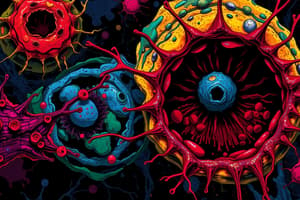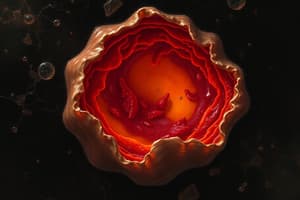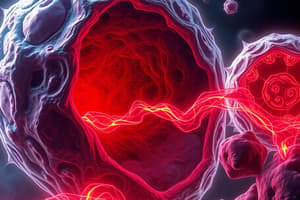Podcast
Questions and Answers
What is the main characteristic of apoptotic cells?
What is the main characteristic of apoptotic cells?
- They stay intact and unchanged
- They do not break up into fragments
- They cause an inflammatory reaction
- Their plasma membrane breaks (correct)
Which of the following is NOT a cause of physiological apoptosis?
Which of the following is NOT a cause of physiological apoptosis?
- Pathological conditions (correct)
- Endometrial involution
- Menstrual cycle
- Embryogenesis
In which type of cell death does the cell activate intrinsic enzymes to degrade its own nuclear DNA and proteins?
In which type of cell death does the cell activate intrinsic enzymes to degrade its own nuclear DNA and proteins?
- Necrosis
- Pyroptosis
- Apoptosis (correct)
- Autolysis
What happens to the plasma membrane of apoptotic cells?
What happens to the plasma membrane of apoptotic cells?
Which term best describes the programmed nature of apoptosis?
Which term best describes the programmed nature of apoptosis?
During which physiological process would you expect to observe apoptotic cell death?
During which physiological process would you expect to observe apoptotic cell death?
What is the primary function of apoptosis in the immune system?
What is the primary function of apoptosis in the immune system?
What is a common cause of apoptosis in cells?
What is a common cause of apoptosis in cells?
What is the outcome of apoptosis in an infected cell?
What is the outcome of apoptosis in an infected cell?
What is a common morphological change observed during apoptosis?
What is a common morphological change observed during apoptosis?
What happens to apoptotic cells or bodies?
What happens to apoptotic cells or bodies?
What is the primary mechanism by which apoptosis occurs in cells?
What is the primary mechanism by which apoptosis occurs in cells?
What is the role of caspases in apoptosis?
What is the role of caspases in apoptosis?
Which proteins become imbalanced in the mitochondrial pathway of apoptosis?
Which proteins become imbalanced in the mitochondrial pathway of apoptosis?
What happens to cytoplasmic proteins in the mechanism of apoptosis?
What happens to cytoplasmic proteins in the mechanism of apoptosis?
How do the two pathways of apoptosis differ?
How do the two pathways of apoptosis differ?
Which proteins leak from mitochondria in the mitochondrial pathway of apoptosis?
Which proteins leak from mitochondria in the mitochondrial pathway of apoptosis?
What is the main function of the Death receptor (Extrinsic) Pathway in apoptosis?
What is the main function of the Death receptor (Extrinsic) Pathway in apoptosis?
What is the primary role of the "death-including signalling complex" in the death receptor pathway?
What is the primary role of the "death-including signalling complex" in the death receptor pathway?
Which of the following is a specific example of apoptosis induced by the immune system?
Which of the following is a specific example of apoptosis induced by the immune system?
In apoptosis, what happens to the size of the cell compared to necrosis?
In apoptosis, what happens to the size of the cell compared to necrosis?
Which factor distinguishes the plasma membrane of a cell undergoing apoptosis from that in necrosis?
Which factor distinguishes the plasma membrane of a cell undergoing apoptosis from that in necrosis?
What is a common characteristic of cellular contents in necrosis compared to apoptosis?
What is a common characteristic of cellular contents in necrosis compared to apoptosis?
Which process is more likely to be physiologic rather than pathologic?
Which process is more likely to be physiologic rather than pathologic?
Apoptosis is a form of cell death that involves an uncontrolled activation of enzymes.
Apoptosis is a form of cell death that involves an uncontrolled activation of enzymes.
Necrosis and apoptosis have similar features in terms of the cellular response to cell death signals.
Necrosis and apoptosis have similar features in terms of the cellular response to cell death signals.
During apoptosis, cells break up into fragments known as necrotic bodies.
During apoptosis, cells break up into fragments known as necrotic bodies.
Apoptotic cells are not appealing targets for phagocytosis due to their altered plasma membrane structure.
Apoptotic cells are not appealing targets for phagocytosis due to their altered plasma membrane structure.
Physiological apoptosis occurs during hormone-dependent involution in adult endometrial cells.
Physiological apoptosis occurs during hormone-dependent involution in adult endometrial cells.
Apoptosis does not play a role in programmed destruction of cells during embryogenesis.
Apoptosis does not play a role in programmed destruction of cells during embryogenesis.
Apoptosis can be initiated through only one signaling pathway.
Apoptosis can be initiated through only one signaling pathway.
In the mitochondrial pathway of apoptosis, an imbalance in BCL2 proteins leads to caspase activation.
In the mitochondrial pathway of apoptosis, an imbalance in BCL2 proteins leads to caspase activation.
Phagocytic recognition in apoptosis is mediated by the expression of annexin V on the cell membrane.
Phagocytic recognition in apoptosis is mediated by the expression of annexin V on the cell membrane.
Protein cleavage during apoptosis is achieved through the action of protease 'caspases'.
Protein cleavage during apoptosis is achieved through the action of protease 'caspases'.
Apoptotic bodies formed during DNA breakdown are engulfed by the apoptotic cell itself.
Apoptotic bodies formed during DNA breakdown are engulfed by the apoptotic cell itself.
The main function of the execution phase in apoptosis is to initiate cell division.
The main function of the execution phase in apoptosis is to initiate cell division.
Apoptosis can occur due to accumulation of misfolded proteins in endoplasmic reticulum stress.
Apoptosis can occur due to accumulation of misfolded proteins in endoplasmic reticulum stress.
Pathologic atrophy can be observed in parenchymal organs following duct obstruction in the liver.
Pathologic atrophy can be observed in parenchymal organs following duct obstruction in the liver.
Apoptosis is a common cause of cell death in tumors during active growth.
Apoptosis is a common cause of cell death in tumors during active growth.
Apoptotic cells are usually phagocytosed by neutrophils during an immune response.
Apoptotic cells are usually phagocytosed by neutrophils during an immune response.
Apoptosis is more likely to occur in cells deprived of necessary survival signals like growth factors.
Apoptosis is more likely to occur in cells deprived of necessary survival signals like growth factors.
In HIV infection, apoptosis can lead to cell death during viral replication.
In HIV infection, apoptosis can lead to cell death during viral replication.
Apoptosis and necrosis can be distinguished by the size of the cell and the status of the nucleus.
Apoptosis and necrosis can be distinguished by the size of the cell and the status of the nucleus.
Necrosis is exclusively a physiological process, while apoptosis is primarily pathologic.
Necrosis is exclusively a physiological process, while apoptosis is primarily pathologic.
The primary role of the 'death-including signalling complex' in the death receptor pathway is to directly activate executioner caspases.
The primary role of the 'death-including signalling complex' in the death receptor pathway is to directly activate executioner caspases.
In apoptosis, cellular contents may undergo enzymatic digestion, leading to leakage out of the cell.
In apoptosis, cellular contents may undergo enzymatic digestion, leading to leakage out of the cell.
Apoptosis is frequently associated with adjacent inflammation, unlike necrosis.
Apoptosis is frequently associated with adjacent inflammation, unlike necrosis.
DNA damage-mediated apoptosis is a specific example of apoptosis primarily seen in inflammatory cells.
DNA damage-mediated apoptosis is a specific example of apoptosis primarily seen in inflammatory cells.
Apoptosis is a pathway of cell death that is induced by an unregulated suicide program.
Apoptosis is a pathway of cell death that is induced by an unregulated suicide program.
During apoptosis, cells break up into fragments known as apoptotic bodies.
During apoptosis, cells break up into fragments known as apoptotic bodies.
Necrosis and apoptosis have identical features in terms of cellular response to cell death signals.
Necrosis and apoptosis have identical features in terms of cellular response to cell death signals.
Apoptotic cells are not appealing targets for phagocytosis due to their altered plasma membrane structure.
Apoptotic cells are not appealing targets for phagocytosis due to their altered plasma membrane structure.
Apoptosis primarily occurs in cells when they are damaged beyond repair, especially affecting the cells' RNA.
Apoptosis primarily occurs in cells when they are damaged beyond repair, especially affecting the cells' RNA.
In programmed destruction of cells during embryogenesis, apoptosis does not play a role.
In programmed destruction of cells during embryogenesis, apoptosis does not play a role.
Apoptotic bodies are engulfed by the apoptotic cell itself.
Apoptotic bodies are engulfed by the apoptotic cell itself.
Protein cleavage during apoptosis is achieved through the action of protease 'caspases'.
Protein cleavage during apoptosis is achieved through the action of protease 'caspases'.
Necrosis is always pathologic, while apoptosis can be both physiologic and pathologic.
Necrosis is always pathologic, while apoptosis can be both physiologic and pathologic.
Physiological apoptosis occurs during hormone-dependent involution in adult endometrial cells.
Physiological apoptosis occurs during hormone-dependent involution in adult endometrial cells.
Apoptosis does not play a role in the programmed destruction of cells during embryogenesis.
Apoptosis does not play a role in the programmed destruction of cells during embryogenesis.
The main function of the execution phase in apoptosis is to initiate cell division.
The main function of the execution phase in apoptosis is to initiate cell division.
Apoptosis can be initiated through two main pathways: Death receptor (Extrinsic) Pathway and Mitochondrial (Intrinsic) Pathway.
Apoptosis can be initiated through two main pathways: Death receptor (Extrinsic) Pathway and Mitochondrial (Intrinsic) Pathway.
Protein hydrolysis in apoptosis is carried out by protease 'caspases' to break up nuclear scaffold and cytoskeleton.
Protein hydrolysis in apoptosis is carried out by protease 'caspases' to break up nuclear scaffold and cytoskeleton.
Phagocytic recognition in apoptosis is achieved by expressing phosphatidylserine and annexin V on the cell membrane.
Phagocytic recognition in apoptosis is achieved by expressing phosphatidylserine and annexin V on the cell membrane.
Apoptosis is more likely to occur in cells deprived of necessary survival signals like growth factors.
Apoptosis is more likely to occur in cells deprived of necessary survival signals like growth factors.
During the mitochondrial pathway of apoptosis, proteins of the BCL2 family become imbalanced leading to caspases activation.
During the mitochondrial pathway of apoptosis, proteins of the BCL2 family become imbalanced leading to caspases activation.
Activation of caspases is the final step in the execution phase of apoptosis.
Activation of caspases is the final step in the execution phase of apoptosis.
Apoptosis can be caused by DNA damage resulting from exposure to cytotoxic anticancer drugs.
Apoptosis can be caused by DNA damage resulting from exposure to cytotoxic anticancer drugs.
Apoptotic bodies formed during apoptosis are typically phagocytosed by neutrophils.
Apoptotic bodies formed during apoptosis are typically phagocytosed by neutrophils.
Phagocytosis of apoptotic cells is mainly carried out by lymphocytes.
Phagocytosis of apoptotic cells is mainly carried out by lymphocytes.
Apoptosis plays a role in the pathologic atrophy of organs like the pancreas.
Apoptosis plays a role in the pathologic atrophy of organs like the pancreas.
ER stress is a common cause of apoptosis in the central nervous system.
ER stress is a common cause of apoptosis in the central nervous system.
Apoptosis can occur in tumorous cells during both regression and growth phases.
Apoptosis can occur in tumorous cells during both regression and growth phases.
Flashcards are hidden until you start studying
Study Notes
Apoptosis
- Apoptosis is a pathway of cell death that is induced by a tightly regulated suicide program in which cells destined to die activate intrinsic enzymes that degrade the cells’ own nuclear DNA and nuclear and cytoplasmic proteins.
Characteristics of Apoptosis
- Cell shrinkage (increased density of cytoplasm with tightly packed organelles)
- Chromatin condensation
- Formation of cytoplasmic blebs and apoptotic bodies
- Phagocytosis of apoptotic cells or cell bodies, usually by macrophages
Physiological Situations that can Cause Apoptosis
- Programmed destruction of cells during embryogenesis, implantation, organogenesis, developmental involution, and metamorphosis
- Hormone-dependent involution in the adult endometrial cells that break down during the menstrual cycle
- Cell loss in proliferating cell populations intestinal crypt epithelium (homeostasis)
- Elimination of potentially harmful self-reactive lymphocytes to prevent reactions against one’s own tissues
- Death of neutrophils in an acute inflammatory response and lymphocytes at the end of an immune response cells undergo apoptosis — deprived of necessary survival signals (growth factor)
Pathological Conditions that can Cause Apoptosis
- DNA damage: Radiation, cytotoxic anticancer drugs, and hypoxia can damage DNA either directly or via production of free radicals
- Accumulation of misfold proteins: ER stress – basis of several degenerative diseases of the CNS and other organs
- Cell death in certain infections: particularly viral infections (HIV infection, Viral Hepatitis)
- Pathologic atrophy in parenchymal organs after duct obstruction: pancreas, parotid gland, and kidney
- Cell death in the tumors (during regression or active growth)
Mechanism of Apoptosis
- Two main pathways: Death receptor (Extrinsic) Pathway and Mitochondrial (Intrinsic) Pathway
- Proteolytic cascade involving executioner caspases
- Endonuclease activation
- Breakdown of cytoskeleton
- Nuclear fragmentation and cytoplasmic bleb
- Apoptotic bodies
- Phagocytosis
Comparison of Necrosis and Apoptosis
- Necrosis: Cell size enlarged (swelling), Nucleus: Pyknosis → karyorrhexis → karyolysis, Plasma membrane: Disrupted
- Apoptosis: Cell size reduced (shrinkage), Nucleus: Fragmentation into nucleosome size fragments, Plasma membrane: Intact; altered structure, especially orientation of lipids
Studying That Suits You
Use AI to generate personalized quizzes and flashcards to suit your learning preferences.




